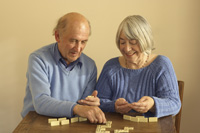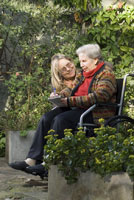Cognitive Problems

Cognition is the process of thinking and knowing things. Damage to the brain after a stroke can cause many cognitive changes. Doing things that once were easy may now be hard. Your loved one may not be aware of these problems. This puts them at greater risk for injury.
Why Is It Important to Get Help?
Changes in cognition are stressful for you and your loved one. Talk with your healthcare team. Professionals can do cognitive testing. They can suggest treatments and tips to deal with cognitive problems. Ask about a referral to a professional who specializes in cognitive problems. Below is a list of providers who can help:
- Neurologists or cognitive neurologists diagnose and treat memory problems.
- Neuropsychologists conduct tests and work with neurologists to treat problems.
- Occupational therapists and nurses suggest practical tips. They provide care in the office or the patient’s home.
Your local stroke associations can provide information. The Resources section has contact information for the American Stroke Association and the National Stroke Association.
What Do You Need to Know?
After a stroke, your loved one’s world is often confusing. Strokes affect people in different ways. For example, some stroke survivors have problems with perception or memory. Other survivors have problems learning or reasoning. Watching these changes in your loved one is difficult. It is normal to be anxious.
The following are tips that may help:
Join a caregiver support group or talk with others − Discussing your fears can help. Other stroke survivors and caregivers will understand. They can offer encouragement and ideas for dealing with cognitive problems. Learn more about stroke support groups.
Talk with other family members − Help them understand that stroke survivors often have cognitive problems.
 Focus on what your loved one can still do − Build on the strengths and skills that weren’t lost. Avoid comparing your loved one to the way they used to be. Some of the changes may be permanent. Others will disappear over time.
Focus on what your loved one can still do − Build on the strengths and skills that weren’t lost. Avoid comparing your loved one to the way they used to be. Some of the changes may be permanent. Others will disappear over time.
Encourage your loved one to exercise their mind − Computer games may help regain thinking skills. Games like word puzzles, playing cards or dominoes may help.
Respect your loved one − Don’t assume they cannot understand you. Don’t talk down to your loved one.
What Is Disorientation?
Stroke survivors sometimes have trouble knowing what day it is. They may get lost or have trouble finding the bathroom. Being able to recognize friends and family members may be lost. This confusion can cause fear and embarrassment. There are ways you can help.
- Remind your loved one where they are. Talk about the time and day of the week. Discuss what is going to happen next.
- Be calm and gentle. Stress will increase your loved one’s confusion. Imagine how difficult it is for your loved one. Reassure your loved one that you are there to help.
- Have a daily routine. Do tasks at the same time each day.
- Place an easy-to-read digital clock on a bedside table.
- Hang a big calendar on the wall.
What Is Perception?
Perception involves making sense of what you see, hear, touch, smell and taste. Of all the senses, vision, hearing and touch are most often affected. Stroke survivors with visual problems may not recognize faces or familiar objects. They may have trouble judging distance and bump into things or misjudge steps.
Other survivors may have a loss of touch sensation. Some survivors may not feel pain or temperature. They may not be aware of being burned with hot water or cut with a sharp knife. Other stroke survivors may not feel the position of their arms or legs. This can cause problems when putting on a shirt or pants. These survivors may also have trouble walking. They may not know when their feet hit the ground. Other survivors may not recognize sounds like the phone ringing.
How Does Stroke Affect Your Loved One’s Perception?
How your loved one’s perception is affected depends on where the damage to the brain occurred. The right and left sides of the brain have different functions. In most people, the left side of the brain controls language. The left side of the brain controls the right side of the body. So, language problems are more common in persons who have right-sided weakness.
The right side of the brain helps us understand what we see, hear and touch. The right side also directs things, such as judging depth, size and distance. The right side of the brain controls the left side of the body. Persons with left-sided weakness have problems with vision, hearing and touch.
Below are ways you can help your loved one:
- Do a safety check. Cut down on clutter to prevent a fall. Learn more about preventing falls.
- Keep items that are used often in easy reach.
- Install night lights in the bedroom and bathroom. Learn more about home modification.
- If your loved one cannot drive, talk about what this means. Be sensitive to their feelings. Learn more about driving and transportation.
What Is Attention or Concentration?
Attention involves focusing on a single object or thought. It also means ignoring the information we don’t want. After a stroke, some survivors have trouble paying attention. They may become easily distracted. It may be hard to do more than one thing at a time. They may have trouble staying on topic when talking with others. Attention problems improve for most people over time.
For others, attention training, like the tips listed below can help.
- Have your survivor listen to a TV or radio program. Ask them to make notes of the main points. This practice may help with concentration.
- Break tasks into steps. Be patient and let your loved one work slowly.
- Keep information simple. Repeat what you say.
- Help your loved one focus on one thing at a time. Avoid noise and lots of people.
What Is Learning?
Learning is processing or taking in new information. After a stroke, your loved one may learn more slowly. Doing new tasks may be hard. The following are ways you can help:
- Have your loved one pace themself. Make sure your loved one does not try to learn too much at once.
- Use simple, step-by-step directions.
- Let your loved one know what you want them to do. Demonstrate the task. You may have to do this many times. It will take time for your loved one to relearn tasks.
- Encourage your loved one to practice tasks many times.
Help your loved one learn new ways of doing things. Occupational therapists can help.
What Are Problem Solving, Planning and Reasoning?
You may notice your loved one has problems thinking about a situation before acting. Your loved one may have trouble thinking through the steps to do a task. They may try to drive or go back to work too soon. Your loved one may have trouble drawing conclusions from facts. These changes are hard to deal with.
Here are some ways you can help:
- Figure out what your loved one can or cannot do. Do not take their word for it. Make sure the environment is safe.
- Be understanding. Help your loved one make sense of information. Help your loved one make simple plans.
- Praise your loved one often. Work with your loved one to solve easy problems.
What Are Some Other Cognitive Problems?
- One-side neglect is being unaware of one side of the body. The survivor does not “pay attention” or respond to things on one side. Learn more about one-side neglect.
- Speech and language problems can make communicating difficult. Many survivors have trouble speaking or understanding what people say. Stroke can also affect the ability to read and write. Learn more about speech and communication problems.
- Memory problems are common after stroke. Learn more about memory problems after stroke.
Remember
- Problems with thinking are common after stroke. They affect each survivor in different ways. Some thinking abilities will return naturally. Others will improve over time or with rehabilitation.
- Be patient. Your loved one is facing many changes. Let your loved one know you are there for support.
- Focus on your loved one’s strength and the tasks they can still do.
Other Resources 
Additional credible resources on this topic can be found here. Website pages may change or update, therefore if a link does not work, you may also try to type the information into your internet search bar. This Resource List will be updated frequently.
|
*Link Disclaimer: Links to information and Web sites outside of the Department of Veterans Affairs do not indicate an endorsement of products or services offered by the sites. In addition, these sites may have privacy and security policies that are inconsistent with those of VA. |
References: American Speech-Language-Hearing Association. (2009).Stroke-WhatCognitive Problems Occur After a Stroke? Retrieved April 7, 2009, from:http://www.asha.org/*; National Stroke Association. (2006).Stroke Facts-Recovery after Stroke: Thinking and Cognition. Retrieved April 7, 2009 from:http://www.stroke.org*; The Stroke Association. (October 2006).Cognitive Problems after Stroke. Retrieved December 9, 2008 fromhttp://www.stroke.org.uk*; Healthwise, Inc. (2006).Stroke Rehabilitation: What to Expect After a Stroke. Retrieved April 14, 2009 fromhttp://www.healthgrades.com*; American Stroke Association. (2009).Cognitive Challenges. Retrieved April 14, 2009 fromhttp://www.strokeassociation.org*; Holistic online.com. (2009).Stroke: Effects of a Stroke: Possible Disabilities from a Stroke – Cognitive deficits: Problems with thinking and memory. Retrieved August 3, 2009 from:http://www.holisticonline.com*
These materials were created for the project:
Web-Based Informational Materials for Caregivers of Veterans Post-Stroke
Project Number SDP 06-327 funded by VA HSR&D Quality Enhancement Research Initiative (QUERI)



















